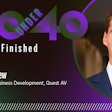.png?auto=format%2Ccompress&q=70&w=400)
“There are so many moments in the entrepreneurial journey that will tell you it’s time to stop,” says Ashlee Ammons, president and co-founder of networking-focused meeting and event platform Mixtroz.
During the early years of Mixtroz, Ammons says she faced moments when she thought it was time to close shop and return to her former job. But Mixtroz encountered a serendipitous moment when it was accepted into Alabama’s Velocity Accelerator program, which helps tech startups with funding and resources, and received $50,000 in cash fusion. Ammons and her mom, Kerry Schrader, co-founder and CEO of Mixtroz, moved to Birmingham and watched their tech dreams flourish.
Even with prestigious accolades to their names, including being on Entrepreneur’s inaugural list of "100 Powerful Women in 2019," and being ranked No. 37 and No. 38, respectively, of Black women to close $1 million in funding, Ammons and Schrader’s rise to the top was not an overnight success.
“People would say, ‘Oh, you and your mom founded a business. That’s so cute.’ And I would quickly tell them that is the most offensive thing you can say because nothing about this journey has been 'cute,'” says Ammons. “It’s been blood, sweat and tears.”
Mixtroz allows users to foster meaningful networking opportunities through its app. The software—which is geared toward corporate groups of 50 or more attendees—is designed to remove friction from the human connection process.
The app came to fruition after Ammons and Schrader attended separate networking events over the same weekend, and each came away with the same conclusion: The days were a plethora of awkward encounters.
The pair researched a solution to the problem but came up empty—so they decided to fill the void themselves.
Venturing into the tech world was a 180-degree turn for the mother-daughter duo. They both left their successful, high-paying jobs (Ammons worked as an event producer and Schrader worked in corporate human resources) to solve pain points they were tired of experiencing in networking situations.
Ammons credits her mom as the reason Mixtroz exists thanks to Schrader’s natural entrepreneurial spirit. While on a sabbatical from her job, Schrader hit the ground running, setting up the LLC and completing the proper business paperwork to get the company started.
While in Nashville, Schrader made connections and learned from other tech startups. On evenings and weekends Ammons would help. Their main learning tool? Google, of course.
“We always joke that we went to the University of Google because when you’re starting a business, everything you need to know is online,” Ammons says.
Among their Google queries were “How do you get an app developed?”, “How do you find developers?” and “How do you compare the cost of developers to make sure you’re getting the best value?”.
Their willingness to seek knowledge paid off. They eventually caught the attention of their alma mater when Google invited the two to speak at the International Women’s Day event in 2019—a full-circle moment. They were then featured in Google’s documentary released in 2020, “After the Start,” which profiled different startups and their journey.
“It’s gratifying when you’re able to talk to a behemoth like Google about ideas that came out of your head that you turned into a business,” Ammons says.
Here, Connect spoke with Ammons about her journey with the company and the lessons she’s learned as an entrepreneur.
How did you overcome early challenges in the business?
When we first started the company, people referred to us as quad outsiders. They were like, ‘You are Black, females, nontechnical and your mom is not a millennial.’ Having my mom has been a benefit with her experience. She’s a Black female who was an executive in human resources in manufacturing, and she was always the sole Black woman. Having my mom on the team to help navigate through discrimination worked well. When we met a barrier, we could break it down together. At a certain point, we got to the place where people would say no. I don’t really believe in no. I think there is always a way to get to yes. I think, as an entrepreneur, you must have that mentality to make it, specifically if you’re someone who is outside the norm.
Did you ever want to give up?
Yes! In the early years, things were moving so slow because of a lack of funding. At 8 a.m., you could get up and say, ‘Yes, today is going to be a great day.’ By 1 p.m., you’re like, ‘Why are we doing this? The business is going to crash and burn.’ To a certain extent, there is still a little of that from month to month, and I think it’s part of the journey. Being an entrepreneur is not for the faint of heart. There are extreme highs and lows, and you have to celebrate your wins so when a low comes you can deal with it.
What influenced Mixtroz's move from Nashville to Birmingham?
It was getting accepted into the Accelerator program. Also, Nashville is a health care and music-centric city. It was a feeling that the company never fit in there. I know it’s not always possible to pick up and move, but if you’re in an ecosystem that doesn’t get you, that’s one of the quickest ways to kill your business.
Mixtroz reached $1 million in funding in 2018, even with women and Black women receiving less than 2% of venture capital funding. What was it like to reach such a milestone?
It was honestly exhausting and super hard. If I was going to go crazy at any point, it would have been during that time. We are in the middle of raising another fund and we are almost done. The last round took six months. We were so exhausted that the day we closed it we said, ‘OK, great. Good night.’ We didn’t celebrate or anything.
Why do you think this round was faster than the first round?
We’re further along and we’re more mature. We know how to talk about business in an investable way. They say once you raise one round of funding it becomes easier, and we’re finding that to be true. Our network has grown. The people we can get a meeting with have changed. One of the biggest things is the cultural shift we have gone through in the U.S. People are now talking about things that were taboo a few years ago. A year ago, I couldn’t say, ‘Oh, hi. I am Black.’ Today I can.
Speaking of the cultural shift, what do you hope is the takeaway moving forward regarding Black-owned event companies in the industry?
With intention. As we head into 2021, ask, ‘How did our bidding process go? Did we actually reach out to a different pool of people than we are used to?’ None of this will change without people changing their intention behind it. It’s easier to go with what you’ve been doing, but if everyone keeps doing what they’re doing, nothing will get better. You’re not doing a good job or paying attention if you’re not taking into consideration what’s going on in the world.
The world has forever changed due to COVID-19. How is Mixtroz pivoting during this time?
We had a virtual feature on our product road map. We were slated to release it in October 2020, and we released in May 2020. But we figured it out as everyone else did. Our software shifted. Mixtroz stayed true to our mission, which is all-around peer-to-peer engagement and data collection, and we’ve realized there was a gap in the market. People are looking for ways to keep their people connected while we’re online and that is exactly what our software does. As we move forward to 2021 and beyond, we are moving toward a hybrid world. I think everyone can conclusively say events moving forward will be hybrid. We started in a live events market and now we have a virtual feature.
You and your mom are from two different generations and each bring a unique perspective to the business. What is one thing you’ve learned from her?
Being bold, brave and authentically you. My mom did something brave, and not very commonplace. She was a corporate executive and years away from retiring and traveling, but she chose the harder way. I think she has transitioned gracefully for someone who is a boomer and is now CEO of a tech startup.



















